Study finds recommended ICU sedatives equally safe, effective
A study published in the New England Journal of Medicine provides the most definitive evidence to date that, of the two drugs recommended for light sedation of patients receiving mechanical ventilation in the ICU, dexmedetomidine or propofol, one is as effective and safe as the other, according to a news release from Vanderbilt University Medical Center.
The new study, a double-blinded, randomized-controlled trial led by researchers at Vanderbilt University Medical Center, enrolled 422 mechanically ventilated adults at 13 U.S. medical centers. As patients were placed on ventilators, roughly half were lightly sedated with dexmedetomidine, the other half with propofol. The patients all had sepsis, an extreme and dangerous bodily reaction to infection.
“We found very similar patient outcomes with the two drugs for brain function, ventilator times and death. From a critical care outcomes perspective, our results show that these two sedatives are equally effective when performing up-to-date ICU care,” said Christopher Hughes, MD, Professor of Anesthesiology, who led the study with Pratik Pandharipande, MD, MSCI, Professor of Anesthesiology.
During the 14 days from the start of mechanical ventilation, the median total days alive without delirium or coma was 10.7 in the dexmedetomidine group, 10.8 in the propofol group.
During the 28 days from the start of ventilation, the median ventilator-free days was 23.7 in the dexmedetomidine group, 24.0 in the propofol group.
Death came within 90 days for 38 percent of those who had received dexmedetomidine, and 39 percent of those who had received propofol.
The median cognitive status score at six months was 40.9 in the dexmedetomidine group, 41.4 in the propofol group. (In both drug groups, at six months following their illness, approximately one in four patients appeared to exhibit clinically important cognitive dysfunction, with cognitive scores two standard deviations below population norms.)

